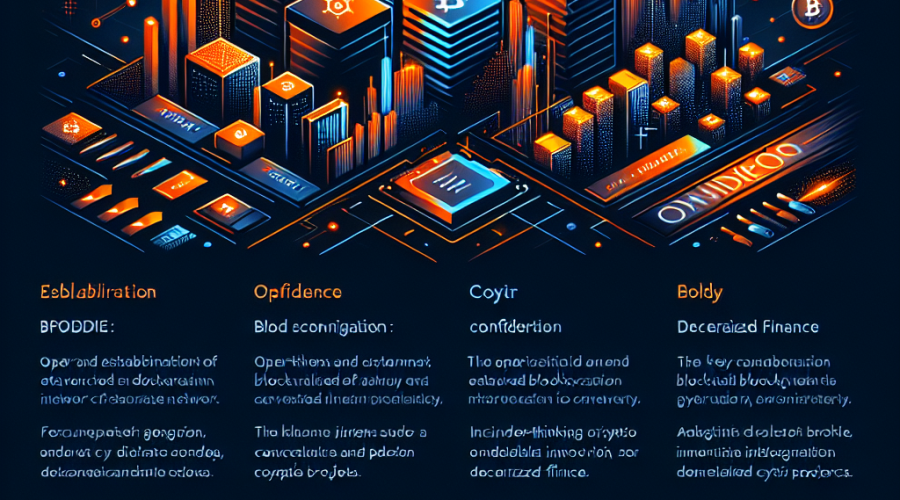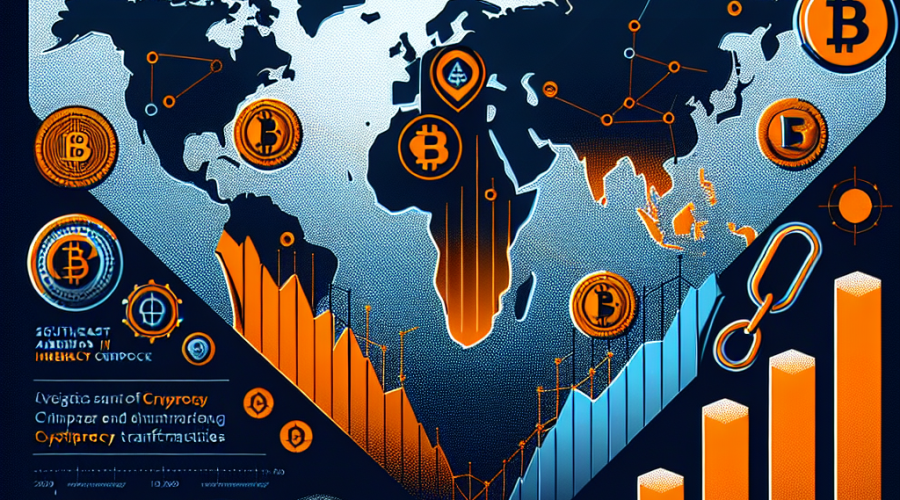July 26, 2025
Nigeria Welcomes Stablecoin Businesses Compliant with Local Regulations, SEC Director General Announces


Financial Analyst & Content Creator | Expert in Cryptocurrency & Forex Education
James Carter is an experienced financial analyst, crypto educator, and content creator with expertise in crypto, forex, and financial literacy. Over the past decade, he has built a multifaceted career in market analysis, community education, and content strategy. At AltSignals.io, James leads content creation for English-speaking audiences, developing articles, webinars, and guides that simplify complex market trends and trading strategies. Known for his ability to make technical finance topics accessible, he empowers both new and seasoned investors to make informed decisions in the ever-evolving world of digital finance.
Latest posts by James Carter
-
James Carter Financial Analyst & Content Creator | Expert in Cryptocurrency & Forex Education
Global markets face increasing risks as analysts warn of excessive optimism, market bubbles, and looming deflation. Explore expert insights on the impact of tightening liquidity, falling commodity prices, and the vulnerability of both stocks and cryptocurrencies. Learn key strategies for investors to manage volatility, safeguard portfolios, and navigate the uncertain economic outlook ahead.
Read more -
James Carter Financial Analyst & Content Creator | Expert in Cryptocurrency & Forex Education
Discover how U.S. government fiscal policy and Treasury bill issuance are emerging as the true drivers of cryptocurrency prices, reshaping investment strategies in Bitcoin and altcoins like DeepSnitch AI, Cosmos, and Optimism. Explore why projects with real utility and long-term value, such as DeepSnitch AI with its auditing tools and staking rewards, are set to outperform in this liquidity-driven market shift. Learn how to adapt your crypto portfolio for a new era dominated by fiscal stimulus rather than just central bank moves.
Read more -
James Carter Financial Analyst & Content Creator | Expert in Cryptocurrency & Forex Education
Pumpfun teams recent 455 million token sale has sparked intense scrutiny across the memecoin community. This in-depth analysis explores the sale’s scale, market impact, transparency concerns, and what it reveals about team accountability, governance, and investor trust in the evolving Solana-based memecoin ecosystem. Discover key market reactions, the role of on-chain analytics, and why transparent communication is vital for the future of crypto launchpads.
Read more -
James Carter Financial Analyst & Content Creator | Expert in Cryptocurrency & Forex Education
Crypto markets are facing high volatility and losses, but tokenized real-world assets are showing strong growth, and utility-driven projects like DeepSnitch AI are capturing investor interest with live tools and presale bonuses. Explore how Avalanche and Solana are stabilizing, and why the shift from hype to function is shaping the next wave of blockchain investment.
Read more -
James Carter Financial Analyst & Content Creator | Expert in Cryptocurrency & Forex Education
Reserve Bank of New Zealand Governor Paul Breman is launching live post-Monetary Policy Statement press conferences, marking a major shift toward greater transparency and real-time engagement with financial markets and the public. This new approach aims to clarify monetary policy decisions, reduce market volatility, and boost public trust by providing direct explanations on inflation, interest rates, and economic challenges. Discover how this move aligns the RBNZ with global banking standards and benefits New Zealanders amid economic uncertainty.
Read more -
James Carter Financial Analyst & Content Creator | Expert in Cryptocurrency & Forex Education
Europe is rapidly advancing towards a digital euro and euro-denominated stablecoins, fueled by central bank support and innovative blockchain solutions. Discover how programmable money, smart contract verification, and projects like DeepSnitch AI are shaping the future of digital finance, enhancing transparency, security, and investor opportunity across the EU’s evolving financial landscape.
Read more -
James Carter Financial Analyst & Content Creator | Expert in Cryptocurrency & Forex Education
Netherlands lawmakers have passed a proposal to implement a 36 percent capital gains tax on savings, investments, and cryptocurrencies, signaling a major shift in financial regulation. This article explores the implications for investors, the rise of AI-powered crypto projects like DeepSnitch AI, and how market volatility and regulatory changes are shaping investment strategies in the Dutch and broader cryptocurrency markets.
Read more -
James Carter Financial Analyst & Content Creator | Expert in Cryptocurrency & Forex Education
Australian Dollar trades near its highest level in three years against the US Dollar as AUD/USD approaches the crucial 0.7100 mark. Discover the key technical and fundamental drivers behind this surge, including central bank policy shifts, strong commodity exports, and global risk sentiment. Learn about comparative currency performance, potential risks, and what traders and investors should watch as the AUD’s momentum reshapes the forex landscape
Read more -
James Carter Financial Analyst & Content Creator | Expert in Cryptocurrency & Forex Education
Discover the latest opportunities in the crypto market as BlockDAG launches its mainnet, offering zero vesting airdrops and staking rewards. Learn why investors are eyeing BlockDAG, Solana’s upcoming Alpenglow upgrade, Chainlink’s real-world integration, and Hyperliquid’s market innovations. Get expert insights on the top cryptocurrencies set to lead the next cycle and how to position your portfolio for the highest potential gains in 2026 and beyond.
Read more -
James Carter Financial Analyst & Content Creator | Expert in Cryptocurrency & Forex Education
solo bitcoin miner makes headlines by overcoming steep odds to mine block 936100 and earn over 213000 using rented hashpower this rare event highlights the risks and rewards of solo mining its role in bitcoin network decentralization and the evolving dynamics between mining pools and independent operators discover how solo efforts impact blockchain security and why solo mining continues to matter in the ever-changing cryptocurrency landscape
Read more -
James Carter Financial Analyst & Content Creator | Expert in Cryptocurrency & Forex Education
Revolutionizing privacy for AI and blockchain, the ZKP project introduces a four-layer Layer 1 blockchain with zero-knowledge proofs and hardware-backed Proof Pods for secure, decentralized, and efficient AI workloads. Learn how ZKP’s self-funded, privacy-first approach delivers advanced cryptography, hybrid consensus, decentralized storage, and a transparent token presale to create a scalable, developer-friendly platform for next-generation DeFi and AI applications.
Read more -
James Carter Financial Analyst & Content Creator | Expert in Cryptocurrency & Forex Education
Cryptocurrency payments linked to suspected human trafficking services saw a significant increase in 2025. Chainalysis reports highlight the prevalent use of stablecoins, Bitcoin, and privacy coins within these illicit networks. Emphasis is placed on the role of instant exchangers and the global span of these transactions. The report suggests enhanced pattern-recognition tools and cooperation between crypto companies and authorities could help disrupt these activities. Despite the challenges, the transparency of cryptocurrencies could aid investigative efforts.
Read more
Latest posts from the category News
-
James Carter Financial Analyst & Content Creator | Expert in Cryptocurrency & Forex Education
Global markets face increasing risks as analysts warn of excessive optimism, market bubbles, and looming deflation. Explore expert insights on the impact of tightening liquidity, falling commodity prices, and the vulnerability of both stocks and cryptocurrencies. Learn key strategies for investors to manage volatility, safeguard portfolios, and navigate the uncertain economic outlook ahead.
Read more -
James Carter Financial Analyst & Content Creator | Expert in Cryptocurrency & Forex Education
Discover how U.S. government fiscal policy and Treasury bill issuance are emerging as the true drivers of cryptocurrency prices, reshaping investment strategies in Bitcoin and altcoins like DeepSnitch AI, Cosmos, and Optimism. Explore why projects with real utility and long-term value, such as DeepSnitch AI with its auditing tools and staking rewards, are set to outperform in this liquidity-driven market shift. Learn how to adapt your crypto portfolio for a new era dominated by fiscal stimulus rather than just central bank moves.
Read more -
James Carter Financial Analyst & Content Creator | Expert in Cryptocurrency & Forex Education
Pumpfun teams recent 455 million token sale has sparked intense scrutiny across the memecoin community. This in-depth analysis explores the sale’s scale, market impact, transparency concerns, and what it reveals about team accountability, governance, and investor trust in the evolving Solana-based memecoin ecosystem. Discover key market reactions, the role of on-chain analytics, and why transparent communication is vital for the future of crypto launchpads.
Read more -
James Carter Financial Analyst & Content Creator | Expert in Cryptocurrency & Forex Education
Crypto markets are facing high volatility and losses, but tokenized real-world assets are showing strong growth, and utility-driven projects like DeepSnitch AI are capturing investor interest with live tools and presale bonuses. Explore how Avalanche and Solana are stabilizing, and why the shift from hype to function is shaping the next wave of blockchain investment.
Read more -
James Carter Financial Analyst & Content Creator | Expert in Cryptocurrency & Forex Education
Reserve Bank of New Zealand Governor Paul Breman is launching live post-Monetary Policy Statement press conferences, marking a major shift toward greater transparency and real-time engagement with financial markets and the public. This new approach aims to clarify monetary policy decisions, reduce market volatility, and boost public trust by providing direct explanations on inflation, interest rates, and economic challenges. Discover how this move aligns the RBNZ with global banking standards and benefits New Zealanders amid economic uncertainty.
Read more -
James Carter Financial Analyst & Content Creator | Expert in Cryptocurrency & Forex Education
Europe is rapidly advancing towards a digital euro and euro-denominated stablecoins, fueled by central bank support and innovative blockchain solutions. Discover how programmable money, smart contract verification, and projects like DeepSnitch AI are shaping the future of digital finance, enhancing transparency, security, and investor opportunity across the EU’s evolving financial landscape.
Read more -
James Carter Financial Analyst & Content Creator | Expert in Cryptocurrency & Forex Education
Netherlands lawmakers have passed a proposal to implement a 36 percent capital gains tax on savings, investments, and cryptocurrencies, signaling a major shift in financial regulation. This article explores the implications for investors, the rise of AI-powered crypto projects like DeepSnitch AI, and how market volatility and regulatory changes are shaping investment strategies in the Dutch and broader cryptocurrency markets.
Read more -
James Carter Financial Analyst & Content Creator | Expert in Cryptocurrency & Forex Education
Australian Dollar trades near its highest level in three years against the US Dollar as AUD/USD approaches the crucial 0.7100 mark. Discover the key technical and fundamental drivers behind this surge, including central bank policy shifts, strong commodity exports, and global risk sentiment. Learn about comparative currency performance, potential risks, and what traders and investors should watch as the AUD’s momentum reshapes the forex landscape
Read more -
James Carter Financial Analyst & Content Creator | Expert in Cryptocurrency & Forex Education
Discover the latest opportunities in the crypto market as BlockDAG launches its mainnet, offering zero vesting airdrops and staking rewards. Learn why investors are eyeing BlockDAG, Solana’s upcoming Alpenglow upgrade, Chainlink’s real-world integration, and Hyperliquid’s market innovations. Get expert insights on the top cryptocurrencies set to lead the next cycle and how to position your portfolio for the highest potential gains in 2026 and beyond.
Read more -
James Carter Financial Analyst & Content Creator | Expert in Cryptocurrency & Forex Education
solo bitcoin miner makes headlines by overcoming steep odds to mine block 936100 and earn over 213000 using rented hashpower this rare event highlights the risks and rewards of solo mining its role in bitcoin network decentralization and the evolving dynamics between mining pools and independent operators discover how solo efforts impact blockchain security and why solo mining continues to matter in the ever-changing cryptocurrency landscape
Read more -
James Carter Financial Analyst & Content Creator | Expert in Cryptocurrency & Forex Education
Revolutionizing privacy for AI and blockchain, the ZKP project introduces a four-layer Layer 1 blockchain with zero-knowledge proofs and hardware-backed Proof Pods for secure, decentralized, and efficient AI workloads. Learn how ZKP’s self-funded, privacy-first approach delivers advanced cryptography, hybrid consensus, decentralized storage, and a transparent token presale to create a scalable, developer-friendly platform for next-generation DeFi and AI applications.
Read more -
James Carter Financial Analyst & Content Creator | Expert in Cryptocurrency & Forex Education
Cryptocurrency payments linked to suspected human trafficking services saw a significant increase in 2025. Chainalysis reports highlight the prevalent use of stablecoins, Bitcoin, and privacy coins within these illicit networks. Emphasis is placed on the role of instant exchangers and the global span of these transactions. The report suggests enhanced pattern-recognition tools and cooperation between crypto companies and authorities could help disrupt these activities. Despite the challenges, the transparency of cryptocurrencies could aid investigative efforts.
Read more
Subscribe to new posts
Receive the most up to date insights & strategies
Corporate
Affiliates Program:
AffiliatesTraders Contact:
[email protected]Advertising offer:
AdvertisingYour investments are your responsibility
We do not accept any liability for any loss or damage which is incurred from you acting or not acting as a result of reading any of our publications. You acknowledge that you use the information we provide at your own risk.
Altsignals does not offer investment advice and nothing in the calls we make should be construed as investment advice. Altsignals provides information and education based on our own trades. You are paying to follow our trades that we document for educational purposes.
© AltSignals Trade Calls. All rights reserved.
















